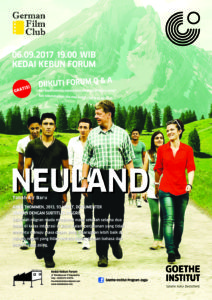

German Film Club
Wednesday, 6 September 2017, 7.00 pm
Auditorium (2nd floor) Kedai Kebun Forum
Jl. Tirtodipuran 3, Yogyakarta
Open for public and free
– followed by Q & A forum “What is the need for integration in a foreign country?” “What is the need if you want to study / work in Germany?” –
presents
New Land (Neuland)
Director: Anna Thommen, 2013, documentary, 93 Min, German with English subtitles
SYNOPSIS
We follow young migrants during their two-year integration course in Basel. They’re in an unfamiliar country with a foreign language and culture, going down an uncertain path which will hopefully lead them to a better future.
They have travelled a long way, by plane, train, bus or boat. And now they find themselves attending an integration course led by teacher Christian Zingg in Basel, where, over the course of two years, young people from all over the world learn the language and culture of the country which might end up becoming their new home. One of them is 19-year-old Ehsanullah from Afghanistan, who crossed the sea in a rubber dinghy and the mountains on foot. And the Albanian siblings Nazlije and Ismail, who left their country for family reasons and are now staying with their father and his new wife.
In Christian Zingg’s class, all three of them hope to leave their past behind and live their dreams in Switzerland. The teacher doesn’t delude himself or the students, and makes it clear that it’s difficult to start a career in a foreign country. Nevertheless, Mr Zingg never tires of encouraging the students to believe in themselves and in a better future,
But as the two-year course nears its end, the question of whether there is even a place for them in this new country becomes even more pressing.
Director’s statement:
I met Mr Zingg during a media education film project with his former class three years ago. I was impressed by how much trust the young students seemed to have in their teacher. When Mr Zingg told me about his students’ unbelievable and emotion-filled stories, it became clear to me that I had to make a film about the situation. Together, we decided to follow his next class, from the very start of the course all the way to the very end of it.
When we first started shooting, I was curious to learn more about the young people who all gathered together in the schoolyard and about each of their stories. In hindsight, I certainly had my own ideas and prejudices about the young people’s different nationalities. The longer I filmed, the less I thought about those stereotypes and the individuals’ stories and fates became ever more multifaceted. What came next was the admission of my prejudices, and I began to see the people, who were far away from their homelands, with all their contradictions.
The big challenge for me began later on, during the editing process. How was I supposed to show all these intense experiences which took place over two years in a 90-minute film and make them accessible to the audience? How could I create dramatic tension, while at the same time showing life in all its shades of grey?
After several months of intensive work of going through the filmed material, the story NEULAND emerged. I hope that it will touch the audience and raise awareness for the fate of these young migrants, who, day after day, come to us in times of need.
Recommendations:
“Without pathos, overloaded messages, intrusive imagery or flashy dramaturgical gimmicks, this film is able to achieve something that is hardly ever achieved in everyday life. It brings us close to people. Close to their stories, their life events, their fears and joys, without ever exposing them.” (Neue Zürcher Zeitung)
“In her documentary NEULAND, Anna Thommen tackles one of the most socially relevant issues in Europe: migration and arriving in a foreign country. The filmmaker accompanies young migrants over the course of two years and paints a sensitive picture of a teacher who emphatically endeavours to set these young people on the right track. At the end of the course, they are meant to be ‘fit for everyday life’ in Switzerland, speak German, understand the dialect and have a training contract under their belt.” (Extract from the jury’s statement upon awarding the 2014 SOS Children’s Villages Documentary Film Prize)
“We would like to give an honourable mention to one of the thirteen films we have seen. It is a film which stands out for its immense creative confidence. It limits its focus to the microcosm of an integration course in Basel, yet manages to embrace the entire world.” (Extract from the jury’s special mention at the 2014 Max Ophüls Prize)
For more info please contact Uniph +6285725809139